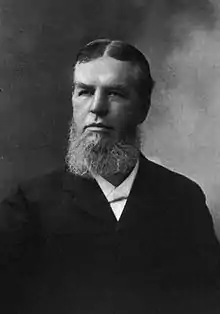John White Chadwick
John White Chadwick (October 19, 1840 – December 11, 1904) was an American writer and clergyman of the Unitarian Church.
| John White Chadwick | |
|---|---|
 | |
| Born | October 19, 1840 Marblehead |
| Died | December 11, 1904 |
| Alma mater | |
| Occupation | Theologian |
| Signature | |
Biography
He was born in Marblehead, Massachusetts. He was apprenticed to a shoemaker early in life, but decided to further his academic learning, and entered the Massachusetts normal school at Bridgewater in 1857.[1] He decided to become a minister, and graduated in 1864 from Harvard Divinity School. That year he also became pastor of the Second Unitarian Church in Brooklyn, New York. His sermons attracted attention, and he became known as a radical teacher of the doctrines of his church. He was elected Phi Beta Kappa poet at Harvard in 1885, and in the following year preached the alumni sermon at the Divinity School. He remained at the Second Unitarian Church until his death in Brooklyn on December 11, 1904.[2]
Writing
He published many of his discourses, which for some time were issued serially, and was a frequent contributor to the Unitarian journals. His publications in book form are:
- Life of N. A. Staples (Boston, 1870)
- A Book of Poems (1875)
- The Bible of To-day (New York, 1878)
- The Faith of Reason (Boston, 1879)
- Some Aspects of Religion (New York, 1879)
- The Man Jesus (Boston, 1881)
- Belief and Life (New York, 1881)
- Origin and Destiny (Boston, 1883)
- In Nazareth Town: A Christmas Fantasy (1884)
- A Daring Faith (1885)
- Evolution and Social Reform (1890)
- Old and New Unitarian Belief (1894)
- The Power of an Endless Life
- The Revolution of God
- Theodore Parker, Preacher and Reformer (1900)
- George William Curtis
- Later Poems (1905)
Notes
- Theodore D. Bacon (1929). "Chadwick, John White". Dictionary of American Biography. New York: Charles Scribner's Sons.
- "Death Balks Church Sermon". The Evening World. December 12, 1904. p. 6. Retrieved February 7, 2021 – via Newspapers.com.
References
| Wikisource has original works written by or about: John White Chadwick |
- Rines, George Edwin, ed. (1920). . Encyclopedia Americana.
- Wilson, J. G.; Fiske, J., eds. (1900). . Appletons' Cyclopædia of American Biography. New York: D. Appleton.
External links
| Wikimedia Commons has media related to John White Chadwick. |